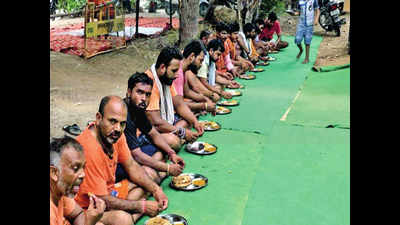- News
- City News
- delhi News
- Delhi: Crockery bank dishes out answer
Trending
This story is from April 13, 2019
Delhi: Crockery bank dishes out answer

Avoid use of Styrofoam or plastic cutlery for distribution of prasad
NEW DELHI: Deeksha Mehta, a 49-year-old who runs a boutique shop in Rajouri Garden area, busily attended calls on Friday. They were all to ask her if they could borrow her steel tableware. Mehta also runs a crockery bank in Nehru Market there. “Ashtami and Navmi start tomorrow and we encourage the organisers of bhandaras to observe a ‘plastic upvaas’,” she chuckles.She has already given out her steel plates for use by temples for the Mata ki chowki.

In a bid to promote zero waste during festivals and religious events, eco activists are reviving ‘crockery banks’, which mimic the collection of pots, pans and dinnerware owned by social organisations and religious groups for their functions. Often, the banks give out 100 steel plates, 100 tumblers and 100 spoons for free use so long as they are returned clean and dry. Using these prevents over 900 pieces of Styrofoam and single-use plastic cutlery ending up in drains, landfills or in the stomach of cattle.
“On the nine days of Navratri, thousands of plastic cutlery and hundreds of Styrofoam plates are used every night. Our aim is to prevent items of bio-nondegradable materials being used,” said Mehta. Since September last year, when the bank began operating, the Rajouri Garden branch alone has saved over 60,000 disposables from ending up in Delhi’s choked landfills.
The concept was founded around nine months ago by Sameera Satija, 45, of Gurugram who decided to buy 100 steel plates and 75 glasses after seeing how the otherwise pious act of serving lassi for Chabeel created a ruinous heap of plastic disposables. The banks operate on the principle of “ask-use-wash-return”. “It is simple,” smiled Satija. “Instead of purchasing plastic plates, just go to a crockery bank and pick up items you want, use them, wash them and return them.”
Satija is slightly disappointed with the tepid response in Delhi, but tells people who ask how they can contribute in the anti-plastic fight to open a branch in their locality. “The Gurugram branches lend a lot,” she said.
“Our message is that it is time to go back in time to when every religious organisation owned their own steel dinnerware for functions as did the resident welfare associations and societies,” Satija added. “We want all such groups to once again create their own small banks for their events. It is a one-time investment. Money spent on buying unhealthy Styrofom can be used in a better way. That would be a good way to celebrate Navratri.”
So, if you’re planning to host a community feast this weekend, you know where to head to for getting free steel utensils and avoiding an unnecessary ecological fallout.

In a bid to promote zero waste during festivals and religious events, eco activists are reviving ‘crockery banks’, which mimic the collection of pots, pans and dinnerware owned by social organisations and religious groups for their functions. Often, the banks give out 100 steel plates, 100 tumblers and 100 spoons for free use so long as they are returned clean and dry. Using these prevents over 900 pieces of Styrofoam and single-use plastic cutlery ending up in drains, landfills or in the stomach of cattle.
“On the nine days of Navratri, thousands of plastic cutlery and hundreds of Styrofoam plates are used every night. Our aim is to prevent items of bio-nondegradable materials being used,” said Mehta. Since September last year, when the bank began operating, the Rajouri Garden branch alone has saved over 60,000 disposables from ending up in Delhi’s choked landfills.
Two other branches have been opened in Subhash Nagar in west Delhi and Shivalik Colony in south Delhi, bringing the number to 12 in the National Capital Region, including one in Noida and eight in Gurugram. Mamata Agarwal, 39-year old designer runs the one in Shivalik. “We have around 200 sets of utensils, and they are almost always out on loan, with satsangs and other events being organised in the locality all the time,” Agarwal said.
The concept was founded around nine months ago by Sameera Satija, 45, of Gurugram who decided to buy 100 steel plates and 75 glasses after seeing how the otherwise pious act of serving lassi for Chabeel created a ruinous heap of plastic disposables. The banks operate on the principle of “ask-use-wash-return”. “It is simple,” smiled Satija. “Instead of purchasing plastic plates, just go to a crockery bank and pick up items you want, use them, wash them and return them.”
Satija is slightly disappointed with the tepid response in Delhi, but tells people who ask how they can contribute in the anti-plastic fight to open a branch in their locality. “The Gurugram branches lend a lot,” she said.
“Our message is that it is time to go back in time to when every religious organisation owned their own steel dinnerware for functions as did the resident welfare associations and societies,” Satija added. “We want all such groups to once again create their own small banks for their events. It is a one-time investment. Money spent on buying unhealthy Styrofom can be used in a better way. That would be a good way to celebrate Navratri.”
So, if you’re planning to host a community feast this weekend, you know where to head to for getting free steel utensils and avoiding an unnecessary ecological fallout.
End of Article
FOLLOW US ON SOCIAL MEDIA










